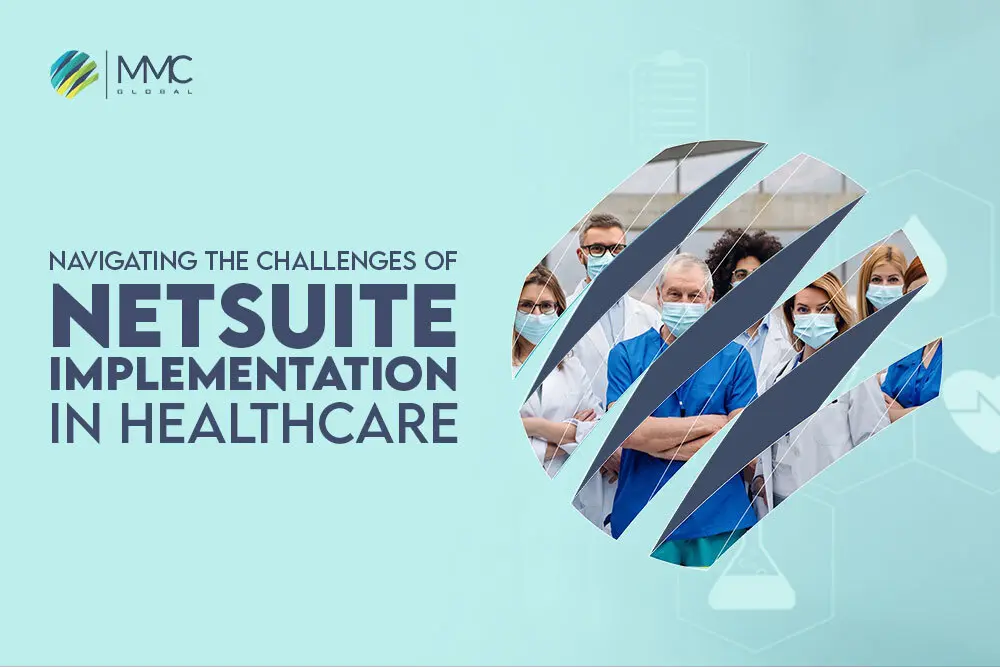Navigating the Challenges of NetSuite Implementation in Healthcare


NetSuite, a leading cloud-based enterprise resource planning (ERP) and customer relationship management (CRM) platform, offers numerous benefits for organizations across industries. In this context, we will discuss the challenges of NetSuite implementation in healthcare.
NetSuite Implementation in Healthcare: The Benefits
Before delving into the challenges, it’s important to highlight the benefits of NetSuite implementation in the healthcare sector. NetSuite ERP provides healthcare organizations a comprehensive solution to manage their financials, inventory, supply chain, and manufacturing processes. NetSuite CRM enables healthcare providers to manage patient relationships, appointments, and marketing activities effectively. Integrating these functionalities in a single platform offers a unified view of operations, improves data accuracy, and facilitates seamless collaboration.
Challenges of NetSuite Implementation in Healthcare
Data Migration and Integration
Healthcare organizations often store vast amounts of data in legacy systems and various databases. Migrating and integrating this data into NetSuite ERP can be a complex process. The challenge lies in ensuring data accuracy and completeness and maintaining data integrity during the migration. A smooth transition requires careful planning, data mapping, and validation processes.
Regulatory Compliance
The healthcare industry is highly regulated, with various compliance requirements such as HIPAA and GDPR. Implementing NetSuite while adhering to these regulations can be challenging. In healthcare organizations must ensure that patient data is secure, access controls are in place, and data privacy is maintained throughout the implementation.
Customization for Healthcare Workflows
Healthcare organizations have unique workflows and processes that may require customization within NetSuite. Custom software development and configuration are often necessary to align NetSuite ERP with specific healthcare requirements. This includes tailoring modules, creating custom reports, and integrating with other healthcare systems and devices.
User Adoption and Training:
Successfully implementing NetSuite in healthcare depends on user adoption. Healthcare professionals may be accustomed to legacy systems or manual processes, making transitioning to a new system challenging. Proper training and change management strategies are essential to ensure users are comfortable with the new system, understand its benefits, and utilize it effectively in their day-to-day operations.

Strategies for Successful NetSuite Implementation in Healthcare
Engage Stakeholders
Involve key stakeholders from different organizational departments and levels throughout the NetSuite development process. Engaging clinical staff, administrators, IT personnel, and executives help gather diverse perspectives, gain buy-in, and ensure the system meets the needs of all stakeholders.
Conduct Thorough Requirements Analysis
Prioritize a comprehensive analysis of your healthcare organization’s requirements before implementing NetSuite. Identify specific workflows, data integration needs, reporting requirements, and compliance considerations. This analysis will inform customization and configuration decisions during the implementation.
Partner with NetSuite Experts
Collaborate with NetSuite development partners with healthcare industry expertise. These experts understand healthcare organizations’ unique challenges and can guide best practices, compliance requirements, and customization options specific to the healthcare sector.
Provide Training and Ongoing Support
Effective user adoption relies on comprehensive training programs and ongoing support. Develop customized training materials and conduct interactive training sessions to ensure users understand the functionalities and benefits of NetSuite. Additionally, provide ongoing support to address any questions or issues arising after the implementation.
Leverage Custom Software Development
Software development can be a valuable asset in healthcare during NetSuite development. Custom mobile app development can enable healthcare professionals to access NetSuite functionalities on the go, improving their productivity and enabling them to provide better patient care. Custom software development can also address specific healthcare workflows and requirements, such as electronic health record (EHR) integration, appointment scheduling, or medical billing.
Ensure Data Security and Compliance
Data security and compliance are critical in healthcare. During NetSuite implementation, healthcare organizations must prioritize data protection and adhere to regulatory requirements. Implement robust security measures like encryption, access controls, and regular data backups. Conduct thorough audits to ensure compliance with HIPAA and other relevant regulations.
Plan for Change Management
Change management is essential for successful NetSuite development in healthcare. Prepare your organization for the transition by communicating the new system’s benefits, addressing concerns, and involving employees in decision-making. Create a change management strategy that incorporates training., ongoing support, and a clear roadmap for the implementation process.
Test and Validate
Thoroughly test and validate the NetSuite development in a healthcare environment before going live. Conduct comprehensive testing of all workflows, data integrations, and customizations to ensure everything functions as intended. Involve end-users in the testing process to gather feedback and make necessary adjustments.
Monitor and Optimize
Once NetSuite is implemented, continuously monitor its performance and seek opportunities for optimization. Regularly review system usage, gather user feedback, and identify areas for improvement. This may involve further customization, integration with different healthcare systems, or incorporating new features and functionalities offered by NetSuite updates.
Read more: Digital Transformation in Healthcare – Upgrades Patient Care
Conclusion
NetSuite development in the healthcare sector can revolutionize operations, improve patient care, and enhance efficiency. However, it comes with unique challenges that require careful consideration and planning. By addressing data migration, regulatory compliance, customization, and user adoption and utilizing strategies such as stakeholder engagement, expert partnerships, and comprehensive training, healthcare organizations can navigate these challenges and maximize the benefits of NetSuite implementation.
Effective NetSuite implementation in healthcare requires a collaborative effort, combining the expertise of NetSuite developers, healthcare professionals, and IT teams. With the right approach, healthcare organizations can leverage the power of NetSuite ERM to streamline processes, improve data accuracy, and provide enhanced patient experiences. Embracing NetSuite and custom software development tailored to healthcare needs can pave the way for a more efficient, connected, and patient-centric healthcare system.



